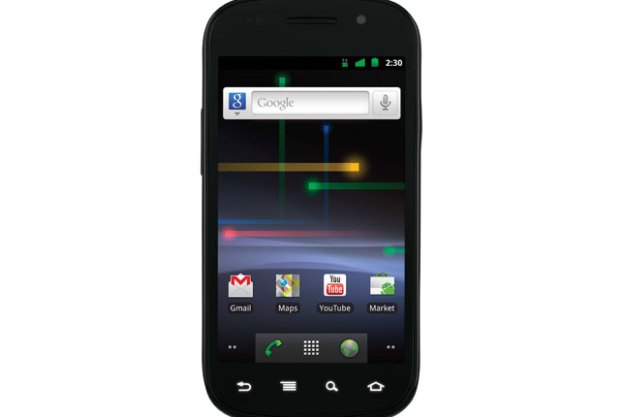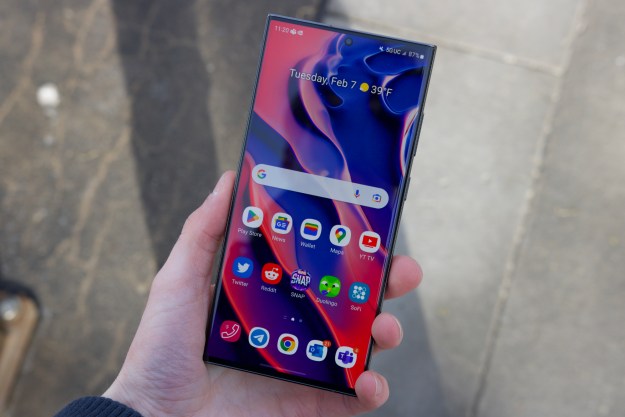
“Google’s Nexus S represents cell phone schizophrenia. It's ahead of its time in some ways, behind the times in others.”
- Large 4-inch WVGA (480 x 800) Super AMOLED screen
- Faster Android v2.3 Gingerbread OS
- 1GHz Cortez A8 Hummingbird processor
- Long battery life
- 16GB memory built-in
- Screen has greenish tint
- Poor camera, VGA camcorder
- No microSD slot
- No pre-installed video chat software
- No social network account syncing
For its next-generation Nexus phone, the unlocked Nexus S made by Samsung (but usually sold with a T-Mobile subsidy for $199.99), Google has produced what can be best described as an advanced basic smartphone. It features some bleeding-edge technologies such as a 4-inch AMOLED screen, Android 2.3 Gingerbread, NFC tag reading, a front-facing camera, and both tethering and mobile hotspot capabilities. These advanced features are undercut, however, by its lack of soon-to-be-standard features for smartphones of its ilk, such as high-definition video recording, HSPA+ 4G to fuel its mobile hotspot, and no pre-installed video chatting app. It makes a fine introduction to Android, but is unlikely to appeal to more advanced users moving to their second or third smartphones.
 Features and design
Features and design
If the Nexus S looks vaguely familiar – that’s because it’s a slightly redesigned version of Samsung’s Galaxy S phone for T-Mobile, the Vibrant. The Nexus S is molded with slightly rounder corners, lacks Vibrant’s silver perimeter band, and moves the microUSB and the headphone jack from the top to the bottom of the phone. They both have a distinctive rear bump on the bottom, and a 4-inch Super AMOLED (active matrix organic light emitting diode) screen. This one is brighter and more colorful, although it does tend toward the greener part of the spectrum. Otherwise, physically, they’re the same phone.
Inside, while both sport a 1GHz processor, the Nexus S runs Google’s latest and fastest Android OS, v2.3 Gingerbread, while Vibrant runs 2.2 Froyo. Both phones include a 5-megapixel camera, but the Nexus S includes an LED flash. The Vibrant includes 720p high-definition recording, while the Nexus S mysteriously records only 720 x 480.
The phone’s singular breakthrough is the inclusion of NFC, near field communication. Wave the Nexus S over an
In other words, there are lots of potential
Similarly undercut is the Nexus S’ front-facing VGA camera, by the lack of QIK or other video-chatting software preinstalled. While there is 16GB of memory built in, like the iPhone, the Nexus S lacks a microSD slot for additional memory.
 Multimedia capabilities
Multimedia capabilities
With its bright, crystalline Super AMOLED screen, the Nexus S makes a wonderful video viewer. YouTube videos load automatically in full screen at high quality. Out only quibble is the screen’s slight green-or-yellowish discoloration, sort of like the tint you see on old displays. Fortunately, it isn’t nearly as bad as the gray sheen that seems to overlay all images on Vibrant.
Google supplements output from the earpiece with a small but loud speaker on the rear. It’s got a tiny guard over the grille, which means music still sounds loud with only a hint of muffling when the phone is placed on its back.
Sound quality
The Nexus S provides plenty of volume, but voices sounded muted and muffled at both ends of cell-to-cell calls, a little less on calls to and from land lines. The excellent rear speaker provides just as much volume for voice as it does for music, lying face up or face-down.
Phone functionality
The Nexus S is faster in every respect – app downloading, booting, website loading, media up- and downloading – than nearly every other 3G Android phone with which we’ve played, although far outshined in data speed by T-Mobile’s 4G phones.
But even though it runs a slightly newer OS and has fun animations on its home page and other gadgets, in many ways the Vibrant is a more finished OS. Settings icons are monochrome on the Nexus S, for instance, color on the Vibrant. On Vibrant you can add contact, photo and social networking accounts syncing for Facebook, Twitter, Flickr and other, but not on Nexus S, which means no

The Nexus S provides one other tiny yet important convenience – the backlit function buttons beneath the screen (Back, Menu, Search, Home) remain lit as long as the display also is lit. On the Vibrant and other Galaxy S models, these controls go blank in a couple of seconds, leaving you to guess where they are once they go blank.
Web and connectivity
As noted, the Nexus S is generally much faster than Froyo 2.2
However, the Nexus S often provided at least one bar of additional signal strength compared to the Vibrant, which on a few occasions slipped into EDGE while the Nexus S held one to two bars of 3G.
 Camera
Camera
With all its advanced features, it’s somewhat shocking that Google imbued the Nexus with only a 720 x 480 video recorder, rather than the high-def recorder found in nearly every other new
As with most cellphone cameras, the Nexus S shoots acceptable 5-megapixel photos outdoors, but even with a flash, indoor results are poor. Overall colors are flat, focus is lost away from the center of the image, and the flash often overwhelms the subject, leaving a bleached image.
Battery Life
Gingerbread’s primary improvement over Froyo is battery life. The Nexus S’ bright display draws nearly a third less power, cell standby mode uses around 10 percent less, and idle draws around 20 percent less, all of which results in far greater overall life. After two days of on-and-off usage, the Vibrant was down to around 20 percent remaining power, while the Nexus S retained nearly half its battery life.
Conclusion
Google’s Nexus S represents cell phone schizophrenia. It’s ahead of its time in some ways, behind the times in others. But these musings are moot; with the floodgates of 4G opening, the Nexus S is about to be drowned in phones with perhaps fewer bleeding-edge technologies, but touting strong 4G capabilities.
Highs:
- Large 4-inch WVGA (480 x 800) Super AMOLED screen
- Faster Android v2.3 Gingerbread OS
- 1GHz Cortez A8 Hummingbird processor
- Long battery life
- 16GB memory built-in
Lows:
- Screen has greenish tint
- Poor camera, VGA camcorder
- No microSD slot
- No pre-installed video chat software
- No social network account syncing
Editors' Recommendations
- The 10 most important things to know about the Google Pixel 8a
- Best Samsung Galaxy S22 deals: Save big on unlocked models
- Samsung’s newest Android tablet is a perfect iPad alternative
- Bixby vs. Google Assistant: Which AI is better for you?
- When is my phone getting Android 14? Here’s everything we know






